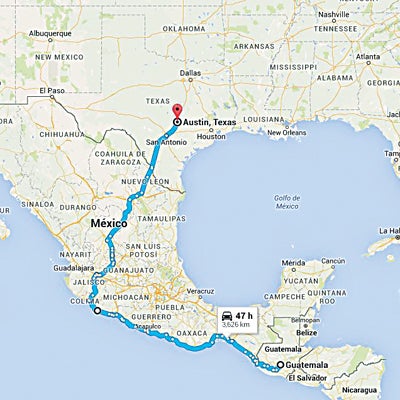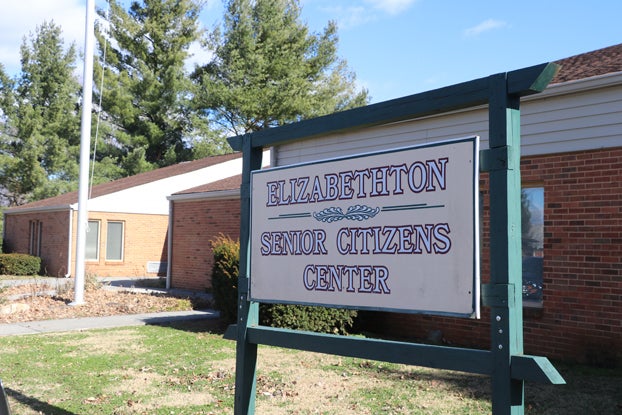Elizabethton native bikes home from Guatemala
Published 8:30 am Monday, January 4, 2016
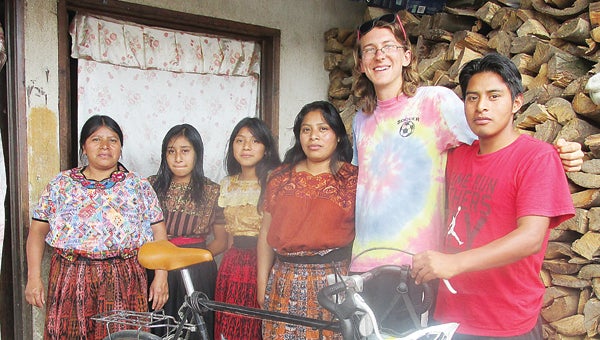
Contributed Photo
LaPorte is pictured with host Hilder (right) and his family in San Juan Ostuncalco, Quetzaltenango, Guatemala. He met Hilder the day before while waiting in the rain at a bus stop. Hilder and his mother and three sisters taught LaPorte a few phrases in their native language, Mam.
“Budget travel” is a rash understatement to describe the way an Elizabethton native covers thousands of miles.
David LaPorte, 23, most recently ventured from Guatemala to Austin, Texas, a 2,400-mile journey, on a 1980s model 10-speed road bike, custom built by him and a friend in Guatemala. He then hitchhiked home to Elizabethton to spend the holidays with his family. The total cost of the trip was about $300 — less than what most Tennesseans pay for rent in a month.
“By bike, you get to see everything little by little,” he said. “If you fly or drive, you miss so much.”
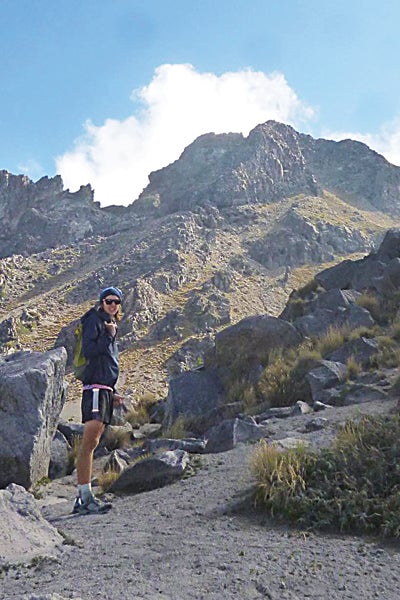
Contributed Photo
Here, LaPorte is backpacking up the extinct volcano Nevado de Colima in Jalisco, México. “It’s a loose scree scramble to the summit, behind me,” he said.
Averaging 60 miles and one flat tire daily, he made the trek in six weeks. He spent $100 building his bike, $50 on repairs and about $150 on food. In previous trips, he packed a stove and cooked most meals, but this time, he didn’t.
“I could have done it cheaper, but I ate well and didn’t cook,” he said, noting that he not only ate heartily, but that he ate a lot, often three to four times his normal caloric intake.
By camping and staying with hosts, lodging expenses were zero.
Occasionally, with the permission of a church’s Father, he camped in fenced-in church yards, as well as on beaches, deserts and elsewhere.
He primarily used two online networks to stay with host families at no cost —www.couchsurfing.com and www.warmshowers.org. These websites connect travelers around the world with hosts, each of which have a detailed profile and reviews.
Both hosts and travelers give the programs excellent reviews regarding safety, reliability and overall experience. LaPorte said hosts with Warm Showers, which is specifically for touring cyclists, were especially accommodating due to the nature of his trip. They often shared the best routes, maps and meals.
“Tour cycling is so unique,” said LaPorte. “People want to hear your story and feed and host you. What makes the trip is meeting the people.”
Currently a geological engineering graduate student at Colorado School of Mines, he is completing his field work in Guatemala.
Though it was radically cheaper than flying or driving, returning home on two wheels was not a budget decision — LaPorte prefers the adventure.
“I love traveling simply and especially by land,” he said. “Hitchhiking and tour cycling, to me, are the greatest ways because you get to see everything along the way, little by little.”
He noted it’s also economical.
“I think a lot of people feel that travel is out of reach, but it’s mainly a time commitment,” LaPorte said. “This is really affordable.”
Along his route, he swam in the ocean, climbed volcanoes and cruised the coastline on a narrow cliffside road that winded occasionally through quaint towns.
“I learned about how diverse Mexico is with people, food, culture, climate, languages — it was amazing.”
He celebrated Mexican Independence Day in the colonial mountain town of Zacatecas, where locals held a parade. While there, he hiked the nearby volcano to the sacred lake in its caldera.
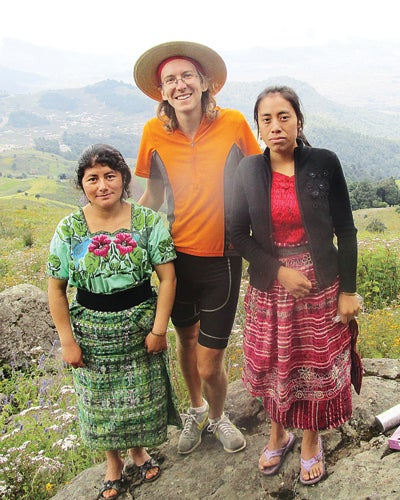
Contributed Photo
LaPorte stands on the summit of Volcán Cuxliquel with Lucy and Marta, friends of his host in San Cristóbal, Totonicapán, Guatemala.
Additionally, he hiked a volcano in Guatemala with two women and camped at 12,000 feet in a frigid night. While crossing a desert, he slept through chilly nights and even saw snow on the last.
“It took me 3 days to cross the desert,” he said. “It was so isolated and beautiful, and the people out there don’t have bus access or see travelers often, so getting to know them was so neat.”
When he arrived in Austin, he sold his bike to a girl for $80 and two tacos and stuck out his thumb.
Despite the perception by some that traveling alone or hitchhiking is unsafe, LaPorte said his family has been very supportive. In fact, his grandfather Charles “Dude” LaPorte said he and his wife have traveled numerous times to Mexico. Though he said the border is rough, the country is a beautiful place.
David said that his family knows how tediously he plans his trips and takes precautions on the roadway.
After all, this was not his first long distance journey by bike. He also rode from South Dakota to Elizabethton — 1800 miles — and, not surprisingly, that trip cost him only $50. That time, he averaged 80 miles daily on a hybrid Haro bicycle from Hampton Trails Bicycle Shop.
When hitchhiking, he said he had positive encounters and he believes people are unrealistic about the dangers of the road.
“I’m optimistic, and I think that people are innately good,” he said.
He suggests meeting people at gas stations rather than roadside and trying to find people with out-of-state tags that are traveling because the ride will likely be longer.
He also made the point that car owners traveling long distances are probably not looking to rob him. But if they were, they would have little to choose from.
LaPorte said on his second trip, he took with him only minimal supplies including a bivy, sleeping bag and liner, sleeping pad, bike repair kit, air pump and lock, one change of clothes and socks, basic hygiene items, pocket knife, one water bottle and water treatment tablets, a map and sunscreen. All this was in a day pack, wrapped in a trash bag and bungeed to his bike. His shoes wore about like his inner tubes, resisted patching efforts and ultimately had to be replaced. One person was kind enough to give him a pair which he returned home wearing.
“I prided myself on ultralight travel,” he said. “People were surprised that I was touring when they saw what I had with me.”
He began long distance biking in South Dakota while completing his undergraduate program. He hosted couch surfers and then Warm Shower guests and was inspired by a cross country cyclist who later stayed with his parents in Elizabethton.
“‘That’s not too hard,’ I thought. ‘I can bungee cord stuff to a bike and cross the country.’”
He now asserts that tour cycling is one of the easiest adventure sports, noting that people can bike any distance or terrain they choose.
“If you know how to ride a bike, you can do it. Anyone can do it,” he said.
Proper planning with Google maps and people’s advice helped him avoid clustered, less navigable cities in favor of paved back roads. His hosts also gave him suggestions, and he said he could always ask locals for directions as well.
“I really relied on people,” he said.
Touring cyclists are less dependent than some other types of travelers, he explained, because they can feasibly get themselves from place to place without needing rides or other assistance. He believes this independence intrigues people and motivates them to want to support the journey.
“People are so hospitable,” he said. “I’ll probably bike or hitchhike down just to see it again.”
